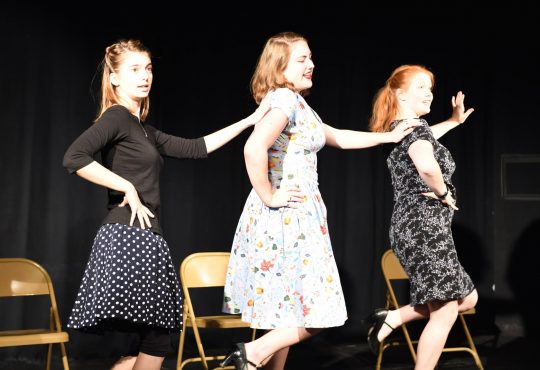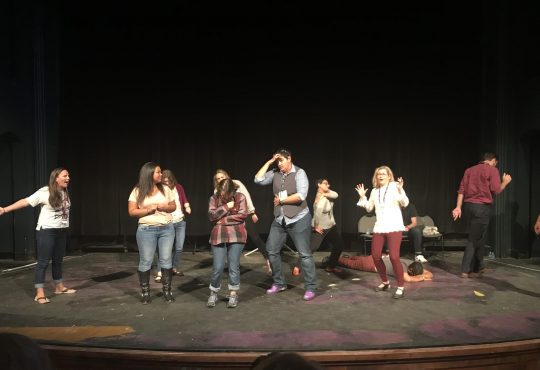University of Puget Sound’s musically-oriented organization Curtain Call presented its musical theater review on Oct. 30 to an enthusiastic full house.
While the month of October no doubt screams Halloween and candy to most people, this semester it screamed “doom and gloom” for the cast of Curtain Call. More specifically, it screamed Doom and Gloom: A Fall Musical Theater Review.
Featuring numbers from Dr. Horrible’s Sing-Along Blog, Into the Woods, The Addams Family Musical, Little Shop of Horrors, Les Miserables, Assassins, Shrek the Musical, Across the Universe, Next to Normal, Company, A Gentleman’s Guide to Love and Murder and The Rocky Horror Picture Show, the showing drew a full audience.
Sitting in Rausch Auditorium a while before the show began, it really didn’t seem like Doom and Gloom would be drawing very many viewers; most seats were empty and except for the cast, there just weren’t many people in the audience.
Unsurprisingly, however, just minutes before show time, the viewers trickled in, filling nearly every seat. Made up of mostly of Puget Sound students with a few professors and other visitors, the audience proved to be enthusiastic and receptive.
The enthusiasm was not unwarranted. Doom and Gloom ultimately proved to be smart, funny and engaging, with just the right amount of doom and gloom to satisfy the Halloween spirit.
Curtain Call presidents Emily Doyle and Michael Stahl, both cast members as well, introduced the presentation, which, with the exception of the final number, was entirely performed, directed and produced by students.
From the first number, “My Eyes/On the Rise” from Dr. Horrible’s Sing-Along Blog, the amount of work and passion that went into organizing Doom and Gloom was evident.
The second number, “Good Enough to Eat, an Opera in Miniature,” maintained the level of quality established with “My Eyes/On the Rise.” “Good Enough to Eat, an Opera in Miniature” was entirely written and composed by Puget Sound student Daniel Wolfert.
You don’t have to be a musician to understand that writing and composing a musical piece, one that fits with a particular theme, singers’ voices, and that will be performed in front of an audience, is not easy. It takes work.
“Good Enough to Eat” is a “self-contained” work. It tells the story of a young girl who lives with her evil stepfather and who ultimately discovers her vengeful fairy godmother living in the forest nearby.
Wolfert’s piece combines opera and short story, culminating in a performance that fit the larger theme of doom and gloom. Dissonant voices and violins worked together establishing a performance that was fittingly unnerving, yet nonetheless engaging and impressive.
By far, however, the highlight of the production was the final number. Directed by Director of Vocal Studies Dawn Padula, the entire Curtain Call cast performed “The Time Warp” from The Rocky Horror Picture Show.
Sunglasses and energy abound, the final performance was a fitting end to an impressive show.
All that said, it would be a lie to say that the show was perfect. It was not without kinks and other imperfections.
There were times where some cast members were audibly off-key, or suddenly faltering in pitch or tone and this detracted from the overall aesthetic of the number in question. Too, there is an argument to be made that there could have been some wiser selections in terms of cast.
There were a few moments where performances seemed forced and where cast members did not completely fill the role to which they were assigned. Performers with stronger voices and a less-strained talent for acting could have been chosen.
Nonetheless, the rough spots ultimately did not serve as overly intrusive distractions from the production. The combination of musical numbers supported by excellent musicians, strong performers, production value and the show’s overall ambition overtook the flaws.
Interesting from start to finish, it held the audience and brought what it promised. The work was put in and the curtain closed on a worthwhile performance. Neither cheap nor lazy, Doom and Gloom’s strengths far outweighed its weaknesses.




